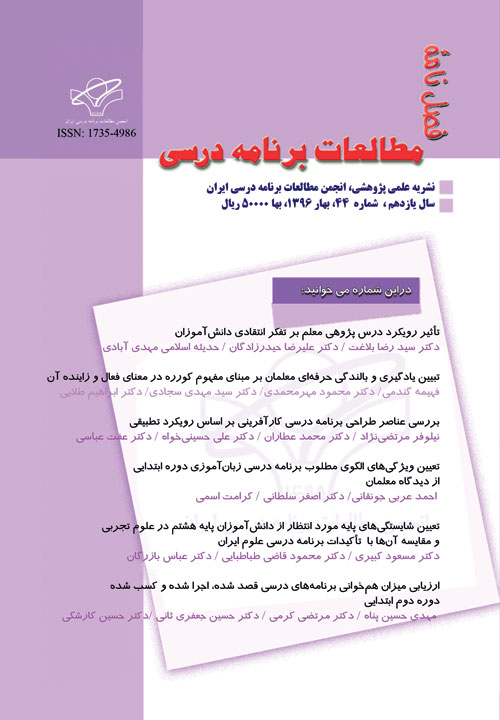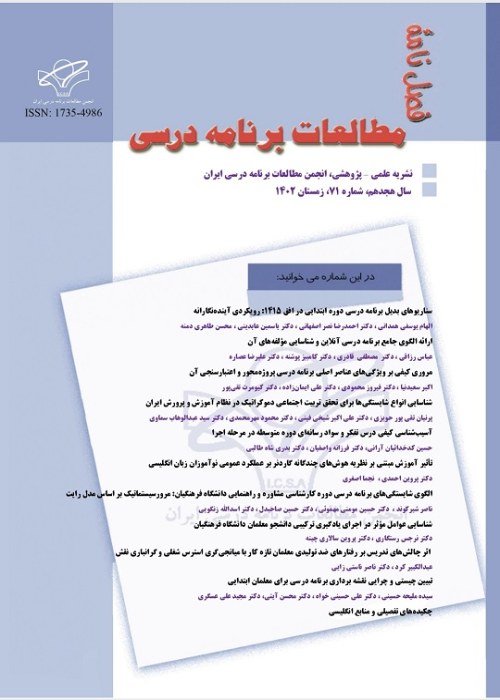فهرست مطالب

فصلنامه مطالعات برنامه درسی
پیاپی 44 (بهار 1396)
- تاریخ انتشار: 1396/03/24
- تعداد عناوین: 6
-
-
Pages 1-26The purpose of this study is to investigate the potential effects of teacher's lesson study approach on the student's critical thinking. To this aim, quasi-experimental method is used and the population include all of the fourth graders in district 2 in Zahedan. The study samples are 60 students who are selected by purposive sampling method from the fourth grade that are divided equally between the experimental and control groups. In this study the standard questionnaire has been used (Facione Critical Thinking). For analysis of data, independent t-test and single one sample t test have been used. The results show that the level of students critical thinking in the control group and experimental group are different in the post-test phase. This means that implementation of the lesson study approach could affect the level of critical thinking of students in the experimental group.Keywords: approach, lesson study, critical thinking, forth elementary schools, Zahedan
-
Pages 27-48Abstract: Achieving an accurate professional development could facilitate its development. The formal programs of professional education, with a prescriptive approach, view teachers professional development as an imposed process. This approach is based on a traditional concept of currere; the most important weakness of this approach is neglecting the teachers agency in his/her learning process. Thus, the main reason for the failure of attempts to make changes in education might be neglecting this crucial point. To the author, recognizing the teachers agency in their own professional development leads us to recognition of a different nature of currere concept, which can be considered as a productive or active concept occurring in a post formal education. Accordingly, the present research is an attempt to explain teachers professional development based on the currere concept in its active meaning. This is a philosophical study that aims to interpret the currere concept in its active meaning. The new conceptualization of currere can provide a different and valuable interpretation of teachers professional development.Keywords: teacher's professional development, in-service curriculum as Event-in-the-Making, the active meaning of currere, agency in learning
-
Pages 49-80This paper investigated the components of entrepreneurship curriculum, including goals, content, learning activities, and teacher role, based on the documentaries in Iran and seven developed countries. First, the existing situation in Iran has been described, then the favorable situation in the other countries is stated, and finally the comparison was performed for two situations. According to the findings, in Iran documents, entrepreneurial goals and competencies are mentioned; but there is a lack of facilities due to the lack of a systematic procedure for teachers training and employment, and ineffective relationships between education and other institutions. The entrepreneurship content is too narrower in Iran. Learning activities are limited to school, namely applied activities in real work place, and individual and group projects on business are ignored. Also, the teacher role, in best condition, involves active implementation of curriculum; while in the developed countries, teacher has many authorities on selection and developing the curricula.Keywords: Design, Entrepreneurship Curriculum, Comparative Approach
-
Pages 81-108Abstract: Language learning at the elementary level improves students competency in language skills. Fulfilling this valuable goal requires the use of an appropriate model for elementary language teaching curriculum. Accordingly, the main purpose of this study is to determine the characteristics of desired model for elementary language teaching curriculum from teachers point of view. This study is conducted through an interwoven mixed method. The statistical population in the quantitative section included all elementary teachers in Kerman. From this population, 350 teachers were selected as sample by random cluster sampling. In the qualitative section, the sample included 30 pre-provincial teachers at the elementary level. The research instrument in quantitative section was a researcher-made questionnaire. In the qualitative section, a semi-structured interview was used to collect data. The results revealed the teacher priorities on three sections of fundamentals, principles and elements of elementary language teaching curriculum. These findings have important implications for curriculum designers and the writers of language teaching textbooks for elementary education.Keywords: curriculum, language teaching, elementary school, teachers
-
Pages 109-140This study focuses on the specification of learning outcomes in science education that is considered as a crucial phase in curriculum development. To achieve aim, a systematic review was conducted on three categories of references; including international agencies on science education, science curricula, and large-scale assessment on science; and 22 competencies were extracted. The extracted competencies were categorized into 5 groups: knowledge and applied, higher order thinking, using models and charts, scientific inquiry and attitude competencies. In the next step, these groups were reviewed according to the emphases in science curriculum of Iran. The results showed that although several competencies under study were highlighted in science curriculum of Iran, 11 competencies were not. These competencies included using of science in real world, knowing of application of scientific instruments, and doing mathematics operations, in knowledge and applied competencies; integrating of knowledge, scientific explaining of natural phenomena, and criticizing of methods and performance of others, in higher-order thinking competencies; using of models, in using models and charts competencies; evaluating evidence and scientific reasoning, in scientific inquiry competencies; and supporting of inquiry and viewing skepticism of science in attitude competencies. According to the obtained results, the authors are recommended to attend to theses competencies throughout the process of improving the science curriculum.Keywords: Science, Science education, Competencies of students, science curriculum
-
Page 141This study seeks to investigate the designed and implemented research competency curriculum for the students at the second grade of primary school. This research is a descriptive survey. The population include documents from educational system, domestic and foreign experts and the results of some research with purposive sampling, the National Curriculum Document and a number of studies that focus on the introduction of management competencies. To design a competency model, the design approach (Model Byham and Meyer) was used in five stages. For the analysis of obtained data, indices such as mean, standard deviation and t-test were used. Finally, given the research competency model fits the second period was the initial draw, which consists of five specific competencies Cluster sub-clusters 14 and 11 of the general merit.Keywords: Competence, research, research competence, initial second period


